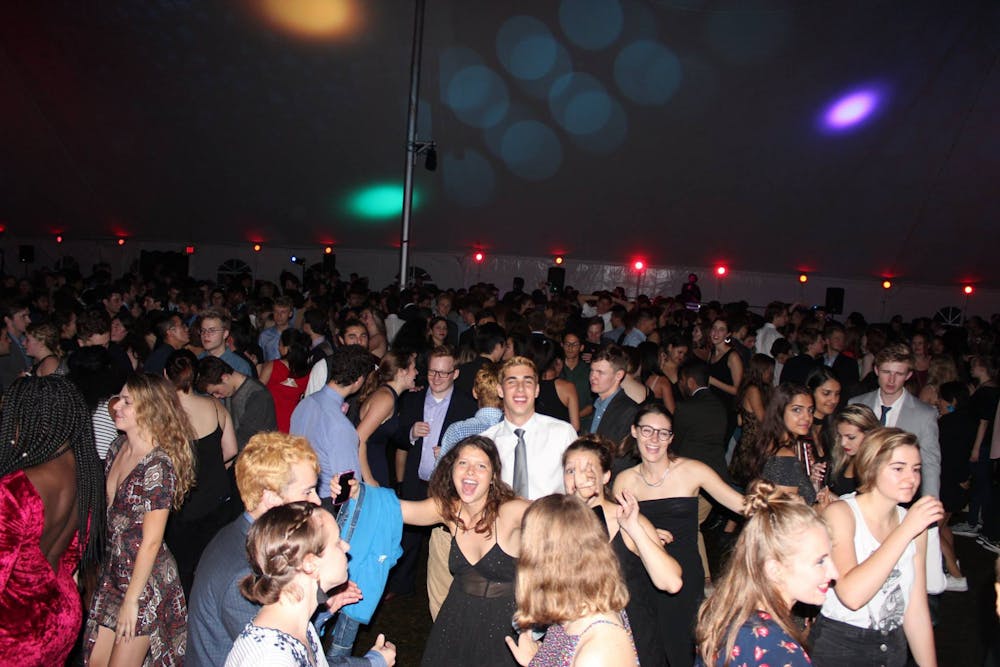On a Saturday night in October, Brown students from all grades would dress up in semi-formal attire and make their way to the Ruth J. Simmons Quadrangle. There, a huge tent would await them, housing live music performers, a photo booth and tables of food. Starting at 9 p.m., this night of dancing would last until well past midnight.
This year, such a scene will not occur.
ANOCH, or a Night on College Hill, is one of the largest events on the Brown calendar. The Class Coordinating Board has held it for six consecutive years from 2014 to 2019, attracting a range of 3,000 to 5,000 students each year, according to the Student Activities Office. Following its cancellation in 2020 due to the pandemic, the organizers from the Class Coordinating Board, after consulting with SAO, decided this year to cancel the dance despite moving forward with a number of other large events, including the Freshman Ice Cream Social, SophomOrientation and Senior Flatbread Night.
“We wanted to make sure that people would be safe going to an event and we wouldn’t be able to guarantee that (for ANOCH),” said Mel Cui ’22, co-president of the class of 2022 CCB.
Bree Zhang ’22, co-president along with Cui, said that because ANOCH is open to all classes, it poses a larger public-health risk than other events the University and CCB have hosted.
“For CCB moving forward, we just want to focus more on class-specific events,” she said.
COVID-19 guidelines are also harder to follow at an event like ANOCH, Cui added.
“The nature of the dance is that people are going to be very close to each other and we won’t be able to ensure that there is sufficient masking,” Cui said.
Many of the large events that the University and CCB held this fall had far more attendees than expected, according to Cui, which prompted concern about the potential turnout at ANOCH.
“A lot of people have missed that feeling of camaraderie with other undergraduates” Cui said. “ Public events, especially ones that are free, have a lot of turnout as a result.”
Because of this, Cui and Zhang worried that ANOCH might be overcrowded and therefore unsafe.
Joie Steele, director of student activities and advisor to CCB, wrote in an email to The Herald that planning delays due to the pandemic also made the event complicated to hold. The process of organizing ANOCH typically starts in the spring, but was postponed due to uncertainty about the fall’s public health conditions, according to Steele.
Although Cui stressed that the biggest factor was public health conditions, she added that “planning on such short notice … would have been difficult.”
Over the summer, Cui and Zhang began partially planning for the event. When she returned to campus for the fall, Cui thought ANOCH would be able to happen. She said CCB had already lined up musical performers and a lighting service. But when the University announced new COVID-19 restrictions Sept. 13 amid a spike in on-campus cases, “we started to shift our mindsets,” Cui said.
CCB is now hoping to host larger events in the spring. “If the health situation allows for it, we will definitely have a lot of great events in the spring that will make up for not having ANOCH in the fall,” Cui said.
Possible spring events include Gigs on the Green, the largest student music festival, and Gala, a formal dance open to all classes, along with Spring Weekend and Senior Week. Zhang also emphasized that specific classes could hold their own dances in the spring if there is enough interest.
Although they said that they are excited for the spring events, Cui and Zhang personally found the decision to cancel ANOCH to be difficult.
“For a lot of members on CCB, ANOCH was the very first event that they attended or the very first event that they staffed.” Cui said. “It definitely is an important event and we are sad we can’t plan it this year,”
“The atmosphere (at ANOCH) is electrifying. When you see there’s so many people there, you meet a lot of new people. … It’s a very unique experience and knowing that it’s planned by students is also very cool,” she said.
Despite the disappointment, Cui and Zhang maintain that canceling ANOCH was the right decision.
“We wouldn’t want our event to be a superspreader,” Zhang said. “It’s for the best.”





